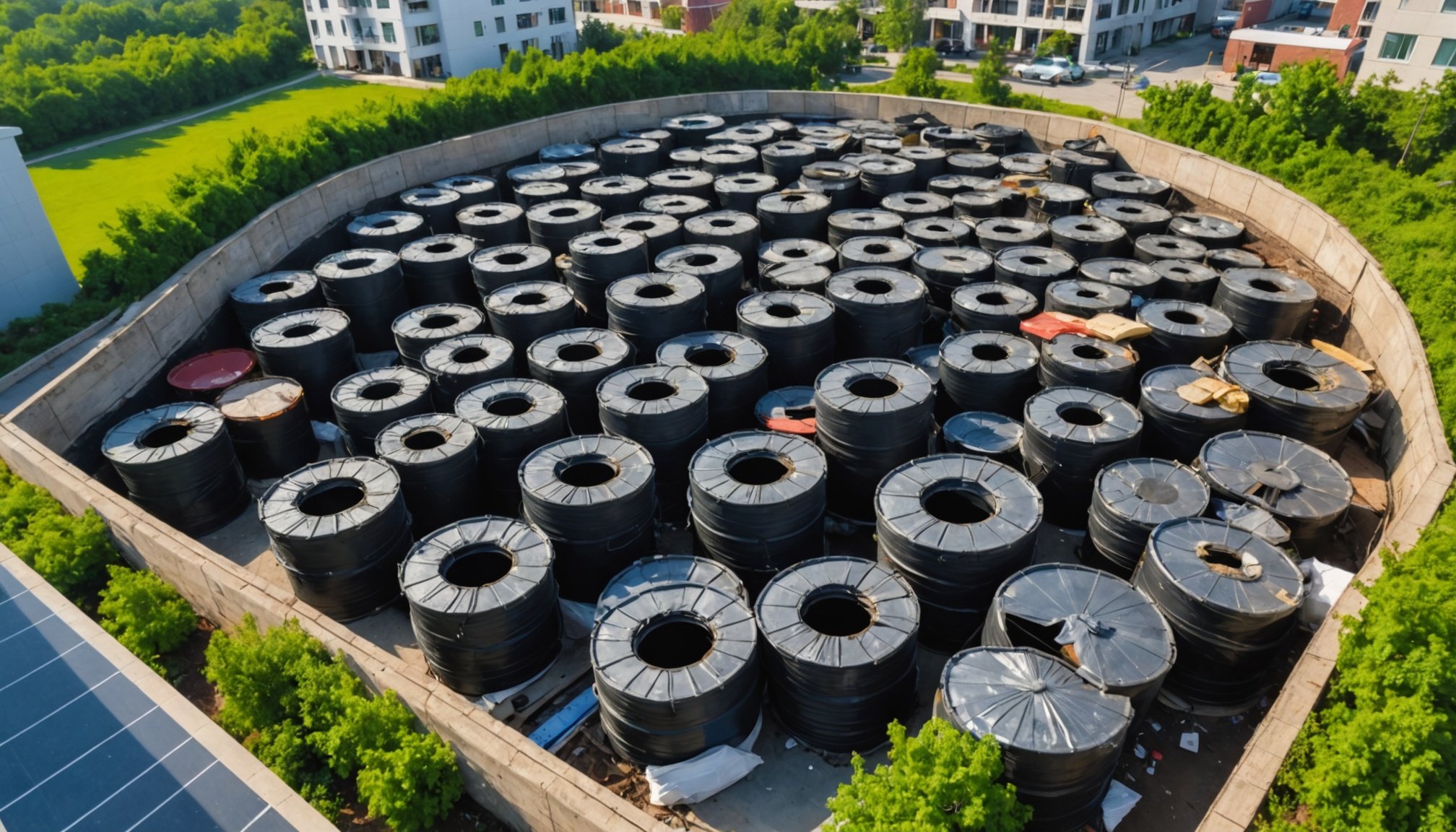Overview of Sustainable Waste Management in Real Estate
The integration of sustainable waste management into real estate development is crucial for mitigating environmental impact. One primary challenge in the sector is the significant waste generated during construction and the maintenance of facilities. Without effective strategies, waste accumulates, creating environmental and logistical issues.
Common challenges include the limited space for recycling facilities on-site and the complexity of segregating waste materials efficiently. Moreover, resistance from project stakeholders and initial costs further complicate implementation. However, incorporating sustainable waste practices has far-reaching positive impacts. It reduces landfill contributions and lowers pollution levels, fostering eco-friendly practices within communities.
In parallel : Unveiling the Surge of Modular and Prefab Homes in Cities: Essential Trends and Insights
Implementing sustainable waste management can lead to:
- Reduced operational costs through minimising waste and recycling materials
- Enhanced building efficiency by reusing resources
- Lower carbon footprint, contributing positively to the environment
Real estate developments can achieve substantial environmental benefits by integrating these practices. This approach not only helps preserve natural resources but also aligns with growing consumer demand for sustainability. Ultimately, addressing these challenges with innovative solutions will pave the way for more sustainable urban development. Integrating these practices results in long-term economic and ecological benefits, reinforcing the importance of sustainable waste management within the real estate sector.
Innovative Waste Management Techniques
The integration of innovative techniques is essential for advancing sustainable waste management in real estate. These waste reduction strategies are designed to decrease environmental footprints and promote eco-friendly practices within developments. By employing zero waste principles, the concept encourages designs that eliminate waste through mindful resource usage, aiming for a sustainable lifecycle in projects.
Zero Waste Principles
Zero waste goals focus on efficiently managing materials to minimise discard rates. Implementing these principles means carefully planning construction to reuse by-products and optimise resource utilisation. For instance, sourcing construction materials locally reduces waste from packaging and transport.
Recycling and Upcycling
Adopting recycling and upcycling on-site significantly contributes to a project’s sustainability. Methods such as repurposing materials for new builds not only reduce landfill waste but also cut costs. Glass, metal, and wood waste can be converted into viable construction elements, offering economic and environmental benefits.
Composting and Organic Waste Management
Composting and organic waste management are vital components of sustainable development. By composting organic materials like food scraps and plant waste, projects can produce nutrient-rich soils. This enhances green spaces and reduces the need for chemical fertilizers, promoting healthier environments. Effective composting also reduces landfill dependency, a major step towards sustainable urban planning.
Case Studies of Successful Implementation
Examining case studies of successful eco-friendly real estate projects offers valuable insights into integrative best practices. These real-life examples showcase innovative approaches to sustainable waste management, offering lessons for future developments.
Highlight Examples of Successful Projects
Notable projects like the BedZED development in the UK demonstrate the effective application of waste reduction strategies. This eco-village uses local materials to minimise transport waste and incorporates a balanced energy management system. Such implementations highlight the potential of integrating sustainability within urban settings.
Analysis of Waste Management Techniques
Case studies reveal that strategic planning is key to success. For instance, the use of comprehensive recycling programs at the Dockside Green in Canada resulted in significant waste diversion from landfills. These projects integrate multiple innovative techniques, like biophilic design and community composting, showcasing a robust blueprint for eco-friendly real estate.
Lessons Learned and Best Practices
The progress of these projects underscores the importance of stakeholder engagement and thorough waste audits. These elements bolster sustainable waste practices, paving the way for replicating success in other developments. Key takeaways include leveraging local resources, maximising recycling processes, and fostering community involvement for enduring impact.
Regulatory Considerations and Compliance
Navigating the landscape of regulations and compliance is vital for successful waste management in real estate. Local and national guidelines are designed to minimise environmental impact, enforce sustainable practices, and ensure that developments align with broader environmental standards.
Overview of Relevant Regulations
Developers must adhere to various rules that dictate waste management protocols. Regulations can differ widely across regions, often requiring real estate projects to implement specific sustainable waste management strategies to minimise waste and pollution. Familiarity with these regulations is essential to maintain compliance and avoid potential setbacks.
Certifications and Standards
Achieving environmental certifications is beneficial for developers as it not only demonstrates commitment to sustainability but also enhances project credibility. Certifications like LEED or BREEAM set benchmarks for eco-friendly practices, promoting standards for waste reduction and resource efficiency. Meeting these criteria can improve both project appeal and consumer trust.
Penalties for Non-Compliance
Failure to comply with established waste management standards can lead to significant consequences. These may include financial penalties, project delays, or even bans on future developments. Developers who prioritise compliance mitigate these risks and position themselves as leaders in eco-friendly practices, fostering a sustainable future within the real estate sector.
Benefits of Implementing Sustainable Practices
Implementing sustainable practices in real estate offers notable economic and environmental advantages. By focusing on waste reduction and resource efficiency, real estate projects can significantly decrease operational costs. Eco-friendly practices contribute to long-term financial savings, as they often involve cost-effective solutions such as material reuse and energy efficiency.
From an environmental perspective, sustainable waste management practices enhance community well-being by reducing pollution and conserving natural resources. Real estate developments adopting these strategies see a decline in landfill contributions, prompting healthier living environments. Building communities that embrace sustainability can result in cleaner air and water, supporting biodiversity and enhancing quality of life.
Moreover, aligning with eco-friendly practices can bolster brand reputation. As consumer awareness of environmental issues grows, demand for sustainable developments increases. Incorporating these practices boosts consumer trust, as buyers and tenants look for properties that reflect their values. Developers advocating sustainability attract conscientious consumers, reinforcing their market position.
Furthermore, implementing sustainability can have ripple effects on the broader community, stimulating ecological awareness. This transformation extends beyond cost savings, diversifying benefits to include ethical and societal impacts, making sustainability a foundational principle in modern real estate development.
Practical Tips for Real Estate Developers
Navigating the journey towards sustainable waste management in real estate can be complex, but focusing on specific strategies simplifies this process. We’ll explore practical tips to guide developers in adopting eco-friendly practices effectively.
Steps for Assessing Current Waste Management Practices
Begin by conducting a comprehensive assessment of existing waste management practices. Identify waste reduction strategies that can offer insights into areas needing improvement. Using tools like waste audits helps evaluate the efficiency of current systems, pinpointing inefficiencies or unnecessary waste streams.
Developing a Sustainable Waste Management Plan
After the assessment, focus on crafting a detailed sustainable waste plan. Key implementation strategies involve setting clear goals and assigning roles for responsibility. Incorporate innovative techniques that align with project specifics, ensuring practical and adaptable solutions to challenges faced during project execution.
Engaging Stakeholders and Communities
Incorporating stakeholder and community engagement is crucial for sustainable initiatives. Facilitate workshops and discussions to share the benefits of eco-friendly practices. Gathering insights can help refine project goals and increase acceptance. This participation fosters a collaborative environment, motivating long-term adherence to sustainable waste protocols. By integrating these approaches, developers enhance both environmental outcomes and social responsibility.










